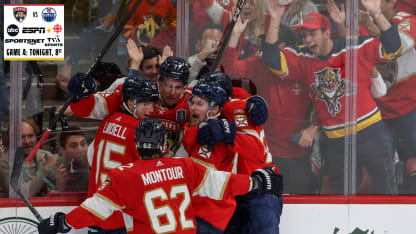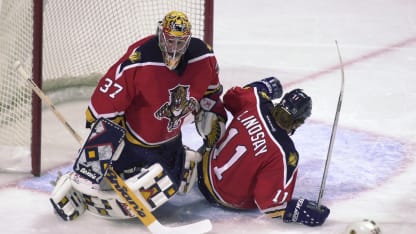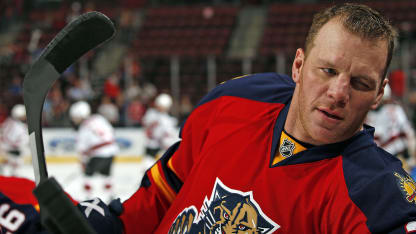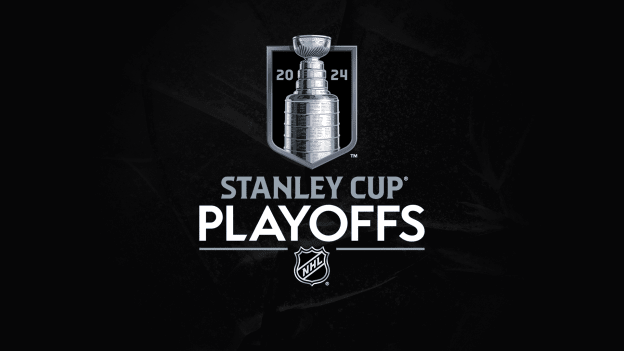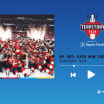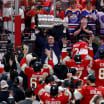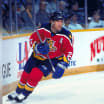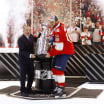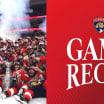EDMONTON -- Keith Yandle walked into the birthday party, ready to pick up his 11-year-old daughter. The kids had been instructed to dress up for the party, to wear a costume marking their favorite character.
He did not expect what he found.
"Three of the girls had (Aleksander) Barkov jerseys," said Yandle, who has settled in South Florida after playing for the Florida Panthers for five seasons between 2016-21. "Just excited about the game. They're 10, 11 years old, but just excited about hockey, excited about having a winning team."
It's a scene that was effectively unimaginable a decade ago.
The Panthers have been in the NHL for 30 sometimes rocky seasons, a franchise that has struggled at times with attendance, with eyeballs, with success on the ice. They made the Stanley Cup Final in their third season, 1995-96, then made the Stanley Cup Playoffs in only four of the next 22 seasons.
But the past five years have seen the Panthers make the playoff each season, reach the elite of the NHL, winning the Presidents' Trophy in 2021-22, winning a round in the playoffs for the first time since that 1995-96 season, then making the Stanley Cup Final each of the past two seasons.
They now sit one win away from the Stanley Cup, leading the best-of-7 Final 3-0 against the Edmonton Oilers, a franchise that has won the Cup five times in its 44 seasons. And if the Panthers can win one more game, with their first chance on Saturday at Rogers Place (8 p.m. ET; ABC, ESPN+, CBC, TVAS, SN), they will etch their names on the Cup and enter the history books.
Steve Goldstein, who has voiced the Panthers on TV and radio, and is currently the team's TV play-by-play broadcaster, has seen a lot in his 17 years with the club. But he's never seen this, where his days and nights are now full into June, where the hockey fans have come out of the woodwork and the non-hockey fans have joined in the party.
There is only one step left.
So, what does winning the Cup do for hockey in South Florida?
"It explodes it," Goldstein said.
* * * *
Hockey arrived in Florida in a hurry.
In 1992-93, the Tampa Bay Lightning played their first games. In 1993-94, the Panthers joined them.
There was success in those early seasons, more for the Panthers than the Lightning. Florida made a run to the Cup Final in its third season, losing in four games to the Colorado Avalanche. It would not return for 26 seasons, rarely even sniffing the postseason.
The Panthers played in Miami Arena in those days, a building that could get loud, an arena that gave rise to the tradition of the rat -- created when Scott Mellanby smashed a rat into the wall with his hockey stick, killing it and giving rise to thousands of plastic rodents thrown on the ice after goals and after wins -- and an arena that bore witness to the most playoff success the Panthers would have.
"It's a rabid fan base," said Bill Lindsay, who played seven seasons for the Panthers, including their inaugural season, the first Stanley Cup Final, and who serves as the team's radio color analyst. "Those early '90s, it was crazy. It was wild."
In 1998, the Panthers opened a new arena in Sunrise, Florida, about 34 miles from Miami and 14 miles from Fort Lauderdale.
But the good times ended, and the franchise went fallow.
"We kept promising our fan base during those times, 'it's going to get better,'" Lindsay said. "It was just tough. We're rolling through players, all kind of different coaches, general managers."
But this began to build in 2013, when Vincent Viola bought the team. Coach Joel Quenneville was hired on April 8, 2019, lending gravitas and a winning pedigree to what the Panthers were establishing. (Quenneville, who resigned on Oct. 28, 2021, in the wake of sexual assault allegations against a former Chicago Blackhawks video coach, is the second-winningest coach in NHL history, with 969 wins.)
It continued with the choice of Bill Zito, the general manager who was brought in on Sept. 2, 2020, and promptly went on a roster-building spree that saw him remake nearly the entire Panthers team in the next three years.
"There were hardly any playoff games played in this building, let alone wins," Goldstein said. "But it really started coming when Joel Quenneville got here and they were scoring a ton of goals and they were winning and they had that great series against Tampa four years ago. They lost in the first round.
"That's when it started. That's when the hockey fans that were maybe dormant came out. The last two years, you got all the non-hardcore hockey fans that are now part of the whole thing."
Which brings the Panthers to now, on the brink of a title, on the brink of greatness, on the brink of legitimacy in the eyes of some.
"A lot of what we consider to be incredibly well-built franchises have suffered when things aren't going well and then they get built," said Panthers coach Paul Maurice, who has the fourth most wins all-time (869) and who was named coach on June 22, 2022. "Carolina, when we were in Greensboro, I think we had 1,200 people one night for a game against Calgary. And if you win and you build a good program, you create an expanded fanbase that isn't necessarily then going to fluctuate with wins and losses all the time.
"You have to, over time, play an exciting game of hockey, but we'd like to be part of that and feel that we're a part of building something with deep enough roots that we would be considered a model franchise. And these runs are critical for that."

